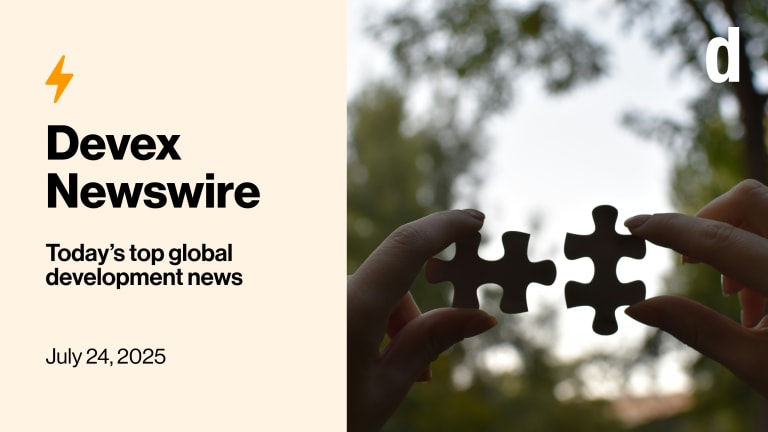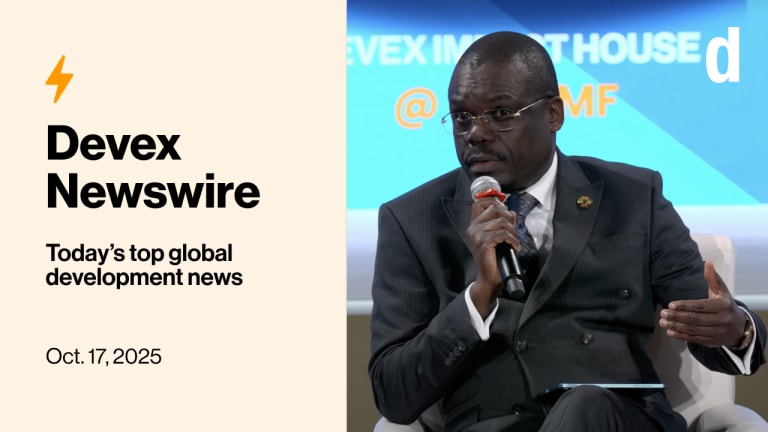Presented by ESSILORLUXOTTICA

Another day, another barrage of bleakness at the World Bank-International Monetary Fund annual meetings. Sadly, it’s not unfounded. Economists, central bankers, and government officials paint a grim picture of what’s expected in the coming year. We’re on the ground and will bring you the gory details.
This is a preview of Newswire
Sign up to this newsletter for an inside look at the biggest stories in global development, in your inbox daily.
Also in today’s edition: Larry Summers urges MDBs to be more “aggressive” in their lending, and we look at how Russia’s invasion of Ukraine has affected the need for refugee support.
Doom/gloom
As expected, the mood is anything but sunny at the World Bank and International Monetary Fund annual meeting this year. The speeches, confabs, and closed-door gatherings have been dismal in tone, says my colleague Shabtai Gold, who’s doing the rounds for Devex, an official media partner of the event.
It’s time to get our house in order because we’re in for a rough time, says IMF Chief Economist Pierre-Olivier Gourinchas, who presented the global economic outlook. A third of the world’s economy is expected to contract — and much of it heading into recession — as inflation, weakening currencies, and a cost-of-living crisis is exacerbated by Russia’s war in Ukraine.
Shabtai says Gourinchas’ press conference was packed to the gills, with a jittery atmosphere as attendees fretted over personal worries — remember, journalists have bills to pay too.
“The worst is yet to come,” says Gourinchas.
The world is in for one of the worst periods for economic growth in the last two decades, surpassed — for now — only by the 2008 global financial crisis and the start of the COVID-19 pandemic, he says.
“The United Kingdom’s economic plan has people spooked, Europe’s energy crisis is a big worry, the war in Ukraine is worsening and creating concerns about the grain deal and food prices, plus everyone’s watching the dollar,” Shabtai writes in a message to me from IMF headquarters.
“But the elephant in the room is Russia.”
Read: 'The worst is yet to come' for the global economy, IMF warns
This too Malpass
The World Bank’s David Malpass has his fingers crossed. He’s betting this week will put all stresses and strains of his climate change blooper behind him so he can move on with the business of running the biggest multilateral lender.
He’s spent weeks batting away criticism and defending his job from calls for his ouster. But frankly, write Shabtai and our colleague Colum Lynch, even if there was a will to remove him from the big corner office, the cost may be too high politically. He’s a Trump nominee, remember?
There are officials in the Biden administration still gunning for him, particularly those focused on climate change, but they have little chance of convincing the White House before the midterm elections on Nov. 8. Still, there’s plenty of time before his term ends in April 2024.
“It could be the quiet before the storm,” Joe Thwaites, an international climate finance advocate, tells Devex.
Exclusive: The campaign to oust Malpass seems to have run out of gas
Related: David Malpass fumbled on climate. Will the World Bank get a rethink?
Eternal Summers shall not fade
Larry Summers — who’s probably somewhat relieved he’s no longer U.S. Treasury secretary right now — urged the World Bank to use its balance sheet "more aggressively," endorsing ideas from a recent G-20 report that pressed multilateral development banks to be riskier and lend by taking on innovative financing.
His comments pile on mounting pressure for banks to bolster funding in an era of multiple crises. The movement got a shot in the arm last week when Treasury Secretary Janet Yellen signaled her willingness to get behind the efforts.
Summers spoke at the World Bank’s annual meeting alongside Malpass, who faces multiple calls to reform the institution he leads.
Malpass appeared to take the critical nudge well, says Shabtai, changing his tone as he proffered that the bank needs to think “really big." He issued an open call to staff to flag scalable projects that would help vulnerable groups such as refugees and "people affected by climate change."
That all sounds great, but the question remains: How quickly can a slow-moving institution like the World Bank change with the global economy in sharp decline? And will shareholder governments like the U.S. be willing to be more risky and aggressive?
If you are a World Bank staffer with scalable ideas, reach out to Shabtai at shabtai.gold@devex.com and tell him about your work!
ICYMI: US treasury secretary asks World Bank to think bigger and lend more
Piling on
But it seems Summers and Yellen have been heard. The Bill & Melinda Gates Foundation, Open Society Foundations, and The Rockefeller Foundation launched a new $5 million grant to encourage multilateral development banks to boost lending to low- and middle-income countries.
The new philanthropic initiative aims to help the lenders “expand capacity” and “scale up lending,” writes my colleague Stephanie Beasley. This morning’s launch comes as the World Bank and IMF, along with other multilaterals, are pressed to bolden their support for countries suffering overlapping crises.
Read: Rockefeller, Gates, OSF launch fund to spur bank lending
The price of war
The money needed to support refugees has ballooned to about $50 billion this year, more than five times what was needed in 2021. That will seriously impact other official development assistance budgets, says my colleague David Ainsworth. And that figure could keep going up.
The impact could last well into 2023. Since Ukrainian refugees began fleeing their homes at the start of Russia’s invasion and continue to arrive in donor countries now, there is likely to be a significant impact on next year’s ODA, writes David.
Typically, refugee costs have hovered around $10 billion a year. The last time costs spiked was in 2016 when Europe faced an influx of Syrian refugees — but costs only hit some $18.4 billion, then 11% of ODA.
“You factor in the increasing costs of the reverberations of the Ukraine war, the food crisis, the effect that inflation is having on prices and in-country budgets,” Sara Harcourt, senior policy director for development finance ONE Campaign. “And it’s really not looking good for the next few years.”
Read: What will happen if refugee costs reach $50B? (Pro)
Read this op-ed: The double standard in charitable giving to Ukraine
+ A Devex Pro membership brings you essential analysis, data-driven funding insights, and access to the world’s largest global development job board. Get these perks and more by signing up to our 15-day free trial.
In other news
On his six-day working visit to France, Ghanaian President Nana Akufo-Addo criticized the Group of 20 major economies' low financial commitment made at last year's Rotterdam summit to fund climate change adaptation in Africa. [Al Jazeera]
More than 900,000 people in South Sudan have been affected by flooding, says the U.N. emergency response agency. [France 24]
An NGO called on Haiti’s government to release some incarcerated people as cholera spreads through the country’s prisons. [AP]
Sign up to Newswire for an inside look at the biggest stories in global development.








